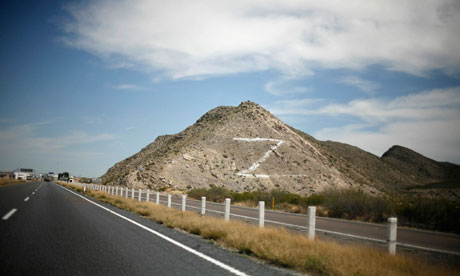Results 1 to 1 of 1
Thread Information
Users Browsing this Thread
There are currently 1 users browsing this thread. (0 members and 1 guests)
-
03-24-2012, 01:31 AM #1
Pope’s visit to Mexico refocuses attention on narco-church relations
Pope’s visit to Mexico refocuses attention on narco-church relations
Priests have to report suspicious donations to their dioceses, but the power of the drug cartels means it is not that simple
The Guardian
Jo Tuckman in Mexico City
Thursday 22 March 2012 06.49 ED

A 'Z' is painted on a hill in reference to the Zetas drug cartel. Photos of
a plaque in a church it built caused a scandal in Mexico.
Photograph: Tomas Bravo/Reuters
Father Erasmo Dorantes doesn't like talking about the new modernist church with a 20-metre high metal cross within his parish in a working-class barrio of the central Mexican city of Pachuca.
"All I do is say mass there every Sunday," he says. "What's done is done and I don't have relations with those people."
Those people are the Zetas drug cartel, or more specifically the group's leader, Heriberto Lazcano. Photographs of a plaque thanking the kingpin for building the church caused a scandal when they were published in a national newspaper in October 2010.
The scandal has faded but the plaque remains – an uncomfortable reminder of the influence of the drugs culture in the Mexican Catholic church that Pope Benedict XVI called on the country's bishops to eradicate shortly after he was elected in 2005. As they prepare for his first visit to Mexico, beginning on Friday, the bishops are keen to play down the issue.
"The warnings from the pope were clear," said Monseñor René Rodríguez, secretary general of the Mexican Episcopal Conference, before adding that constant vigilance meant narco donations were now a minor problem. But while he insisted that priests reported all suspicious donations to their dioceses, which are then reported to the federal government, he also said he did not know how how often this had happened.
A criminal investigation into the Pachuca church was opened, but a source in the attorney general's office said it failed to find hard evidence that illicit money was used. The benefactor simply sent along workers to build it, leaving no financial transactions to trace. The source said there had been no further investigations.
Father Robert Coogan, a Brooklyn-born priest who works in the socially progressive diocese of Saltillo in northern Mexico, said drugs money was constantly channelled into the church in the context of the government's five-year offensive against the cartels, and the accompanying violence that has killed at least 50,000 people.
When prisoners from the Zetas cartel offered last year to paint the jail chapel he administers, the priest said he tried to wriggle out of the situation by arguing that the leaky roof would spoil their work. They not only completed the paint job, but waterproofed the building. Making a fuss, he said, could have triggered reprisals against other prisoners.
Narco donations are often understood as a way for traffickers to cope with living on the edge, or as attempts to buy forgiveness. Coogan sees them primarily as a strategy to underline cartel dominance of the territories where they operate.
"These are tough times and we need to face them," he said. "We need more leadership."
Narco-church relations are nothing new. In 1993 the leaders of the Tijuana cartel held a secret meeting with the papal nuncio in Mexico City as part of an effort to distance themselves from a chaotic shootout that had killed a cardinal in an airport car park eight months earlier. The meeting was brokered by a Tijuana priest who had received bountiful donations over the years.
Pope Benedict's expressions of concern about such relations at the start of his papacy suggested the issue would become a priority. Comments by a Mexican bishop around the same time that equated narco donations to the expensive perfume used by Mary Magdaleneto wash Jesus's feet were quickly refuted by his peers.
But while the bishops have since periodically stressed that drug money can never be purified, and should never be accepted, they have done little else as pressure from the Vatican has waned.
While the pope is expected to talk about the violence battering Mexico during his three-day visit to the Catholic heartland state of Guanajuato, observers believe he is unlikely to make more than a passing reference to corrosion of the church itself.
In the meantime one cartel has sought to take propagandistic advantage of the visit. Banners signed by the Knights Templar cartel hung up around Guanajauto on Sunday welcomed the pope and promised to refrain from "acts of war" during his visit. That same cartel was suspected to be responsible for the appearance of 10 severed heads outside a slaughterhouse in another state on the same day.
source: Pope's visit to Mexico refocuses attention on narco-church relations | World news | The GuardianJoin our FIGHT AGAINST illegal immigration & to secure US borders by joining our E-mail Alerts at http://eepurl.com/cktGTn


 LinkBack URL
LinkBack URL About LinkBacks
About LinkBacks




 Reply With Quote
Reply With Quote


Mike Johnson betrays border security for more foreign aid
04-18-2024, 10:31 PM in illegal immigration News Stories & Reports